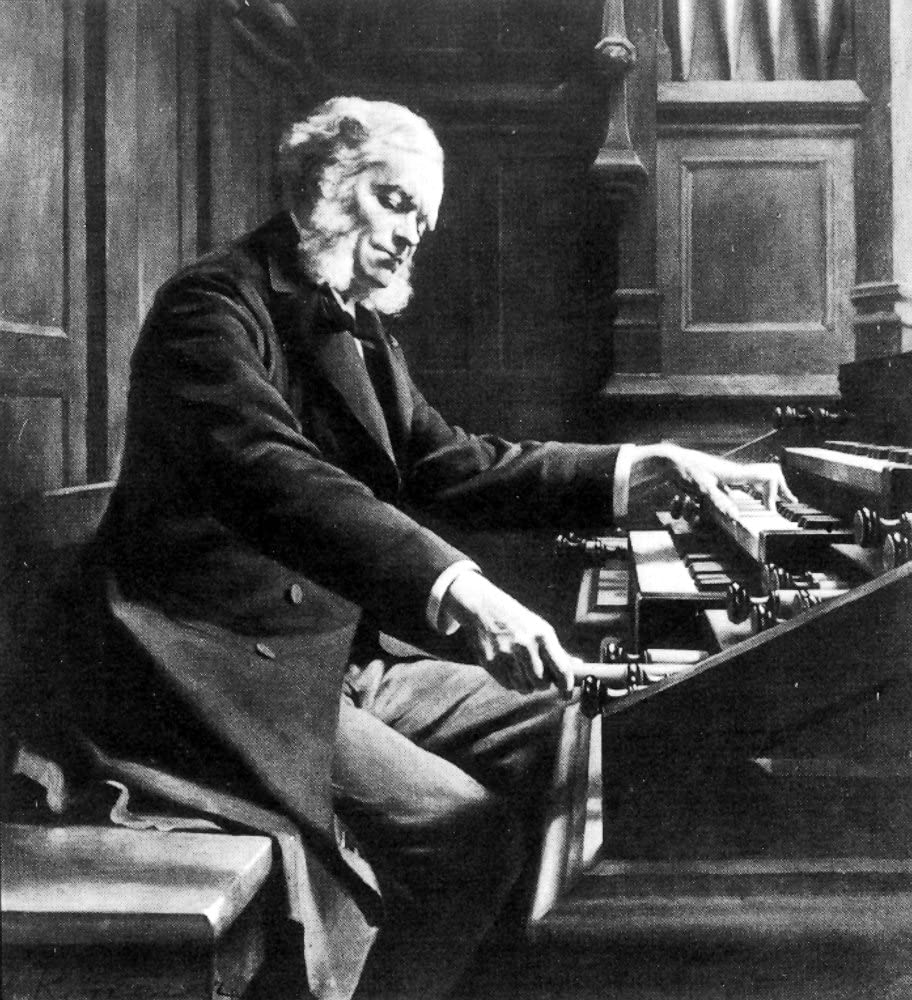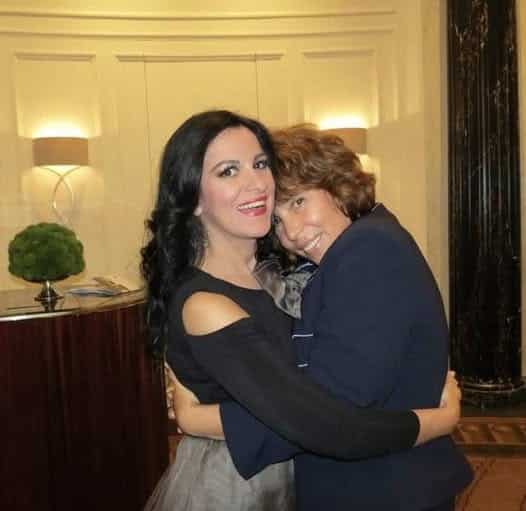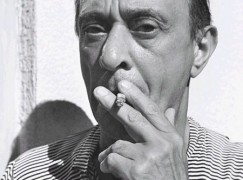Let’s hear more of that old D minor
Album Of The WeekFrom the Lebrecht Album of the Week:
… When I was growing up, great conductors vied to perform Franck’s D minor Symphony. Its mounting climaxes were guaranteed crowd pleasers and there was no shortage of performers, either, for his Symphonic Variations for piano and orchestra. Now, they gather dust.
The D minor symphony is a late work…. It was decried as overly sensual and melodramatic, not least by the composer’s wife. Months after the premiere, the cab in which he was riding was hit by another horse-drawn vehicle, causing a brain injury. Franck died the following year…
Read on here.
And here.
En francais ici
In The Critic here.






Some of us like overly sensual and melodramatic.
It’s one of my faves.
I agree that Franck’s d minor symphony doesn’t deserve to be out of fashion. I’ve read comments to that effect many times in recent years. Which begs the question why it doesn’t come back to fashion.
A similar argument could be made about Cesar Franck’s work in general. There is more than, well, the d minor symphony and the violin (or whatever else) sonata.
A personal favorite is Prélude, fugue et variations, Op.18, both in the original organ version, and at the piano.
https://www.youtube.com/watch?v=lop4Pq_7F1U
https://www.youtube.com/watch?v=IY01u5DhusU
With great regrets, the only time I heard George Szell conduct was at Blossom in late 1969. The concert ended with the Franck…terse, centered…..a revelation….
The NY times recently had an extended piece on the rise and fall of Franck’s Symphony in the standard repertoire.
“Whatever Leopold Stokowski’s thirst for celebrity, he was not known for caving to audience pressure…
“But near the end of most of his seasons in charge, this great showman did bow to mass taste. Philadelphia’s subscribers were invited to vote for their favorite works, with the promise that Stokowski would lead the winners on a closing “request program.”
“For years, the victor was Tchaikovsky’s “Pathétique,”…
“But at the end of the 1923-24 season, a challenger dealt the Tchaikovsky a knockout blow: César Franck’s Symphony in D minor…”
article unlocked:
https://www.nytimes.com/2022/03/18/arts/music/cesar-franck-symphony.html?unlocked_article_code=p6H714km5DxcUYPqBqTQyvOU6R83HcwB-nfQWuX2GbbPKYoIhzmQ2nWdpS_x358XuPsSRuf13MU2uW6NmcMpL5gh0_dcsbDqXoR-Lo4bXA3kU60C03wCPIUjw9UZbNkqBO8Rq47osdVERMAMxFX56EK4XyOtyhqOFGwNGiPtHN63efoL7QJ8iabUX5QiNqRMONwyjEgKLQXkk2bz506FVgk4_vIfFcu3hZOM4ktHlJr-UX0saO6iabWJk7xVWG0nn-ivk8TYpd4oAlprgANRX5pRPrWR0NdZWCP1zjDR91HN-dJP1HoJtU8g-G8PJV4SE8yhywRegce4le2tBmCXoo5q&smid=share-url
Is it sheer coincidence that this review comes up as I contemplate Franck’s orchestral masterpiece? In two weeks I contend with this symphony in an evening of French music with the Puerto Rico Symphony Orchestra. It has not been played here in almost a decade (that tends to substantiate the notion that the work’s popularity has decreased as the 21st century progresses) although this ensemble has seemed to enjoy it since they first played it back in the early 1970s. Also, there has been quite a bit of turnover in the orchestra’s ranks; it will be immensely rewarding to hear what the newer colleagues add to the experience. Sergiu Comissiona, Guillermo Figueroa and Maximiano Valdés have delivered commendable performances of the work here; I am a bit of a beneficiary in terms of there being an institutional memory forged by them. We are using the 2019 Breitkopf & Härtel critical edition which corrects some mistakes and calls attention to some egregious errors in the parts. This D minor Symphony is skillfully written but has indeed any number of pitfalls, amongst those the dangerously inflated dynamics (our Pablo Casals Symphony Hall is very much “alive”) obtaining the implied (French, not German?) organ sonorities, how to meet the challenge of maintaining structural cohesion and the timing of the high and low points of its cyclical form. Easier said than done, I know, because “talk is cheap.” Add to that the issues with the (genuine) spiritual aspects of the work in this age of rampant cynicism, and you are entering a terra incognita that lies somewhere between Fauré, Wagner, Bruckner and Mahler.
My personal ever favorite is the Monteux/Chicago.
He even attended the world premiere in Feb.1889 (!) – He was 12 years old.
The last time I heard it was in Rome by Mikko Franck (a very adequate name for his work) and the Santa Cecília orchestra. A superb performance. I love this work.
In my youth, Ormandy over-programmed it and I still don’t feel the need to rehear it.
I agree wholeheartedly that this glorious, beautiful symphony deserves to be played more often; it’s neglect is hard to understand. But to claim it is not important is just wrong. In this symphony, Franck demonstrated to many later composers how to write a three-movement work with the slow movement incorporating the scherzo. Chausson’s B flat, Schmidt’s 2nd, all the Bax symphonies and many others followed his lead. Franck is easily the least know of the great composers and deserves to be much better known.
In the late 1940s, there was a radio program in the U.S. called, “Quite Please.” The show’s programs were suspense and horror types. Its theme music was an arrangement of the main theme from the second movement of the Franck D Minor Symphony. People knew the music back then.
I’ve never heard it live but would welcome an opportunity to go to a performance of the work.
Though less than a couple generations ago, the Franck Symphony played as much today as say, Schumann 2 or Mendelssohn 3. For bombast it’s been displaced by the 5th Symphonies of Shostakovich, Prokofiev and, most of all, Mahler.
Those shorter works on the release are the real rarities. Audiences would like them, but they’re hard to justify to the sharp-elbowed composers around the table.
‘Chausseur Maudit’ is usually translated as ‘Accursed Huntsman’, not ‘wild hunter’.
‘Redemption’ is a hour-length work with choir and soprano. The release only includes the ‘Morceau Symphonique’ or ‘Symphonic Interlude’ from Redemption, which is just orchestra.
Chasseur
🙂
Perhaps John Adams should have titled his “Short Ride in a Fast Machine” differently: “Le Chauffeur Maudit”…
Back in 1980 this symphony was on the music O level syllabus, plus Le Chasseur Maudit as an example of programme music. I was thoroughly sick of them both by the time the exam came round. But in 2016 there was a performance of the symphony conducted by the late great Zoltán Kocsis which ‘cured’ me of my aversion! It can be seen here https://youtu.be/1vC5lh7B4HI The temptation to gush and over sentimentalise is avoided, without losing any of the drama. Fabulous. And to think Kocsis was suffering from cancer at the time, and only months from his death. Amazing.
The decline and near disappearance of the Franck Symphony (and his Symphonic Variations) is something that has happened in my lifetime, for it used to be commonplace on classical radio both recordings and the many American orchestra broadcasts we used to enjoy. It is hard to explain this change but I do think that at a time when music critics wielded a limited but very real power over programming, it was the sort of work (and Franck the sort of composer) they took aim at.
Because it involves chorus as well as orchestra and is rather lengthy, one favorite work by Franck is one I am unlikely to ever hear in concert in its entirety (sometimes just the orchestral movements are programmed): Psyché et Eros. If Franck’s wife thought the Symphony was over-sensuous, I cannot imagine her reaction to many portions of this work.
Let’s not forget his oratorio, les Béatitudes: a great, seldom-performed work.
When I was in high school, our band director used the last movement of the Franck symphony as an example of, “Ragtime before there was ragtime jazz.”
The LP recording I still play is Guido Cantelli with the NBC Symphony, wonderful early stereo from RCA.